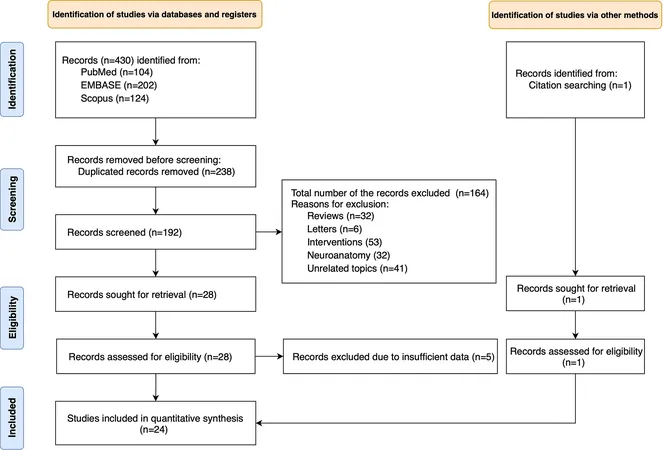
Unmasking Neurophobia: The Overwhelming Fear of Neurology Among Medical Students and Young Doctors
2024-11-09
Author: Mei
A striking phenomenon known as "neurophobia," a term introduced by Ralph Jozefowicz in 1994, encapsulates the intense fear and apprehension that medical students feel toward the field of neurology and the underlying neural sciences. Jozefowicz estimated that nearly 50% of medical students experience this fear at some stage in their education. Since then, research has determined neurophobia's prevalence and risk factors, spotlighting potential remedies to this concerning trend. It emerges from substantial studies that neurophobia is not an isolated issue; it permeates the experiences of not just medical students but also residents and practicing physicians across various regions of the globe.
With an aging population and a rising burden of neurological disorders, it is alarming to consider that neurophobia may deter medical students from choosing neurology as a specialty. This apprehension could contribute to a growing shortage of neurologists—a critical issue as neurological disorders are major contributors to global disability and mortality.
Recent research in 2017 unveiled troubling associations: students' self-reported confidence in diagnosing neurological conditions significantly correlated with their perceived knowledge in the subject matter. This insight reinforces the notion that neurophobia plays a detriment in career pathways for aspiring neurologists.
To tackle existing gaps in knowledge and provide a comprehensive overview of neurophobia’s prevalence, a new systematic review and meta-analysis was conducted. This study evaluated data from numerous published research papers to paint a fuller picture of the neurophobia landscape among medical students and young doctors, identifying both common risk factors and potential solutions to help combat this fear.
The research included over 10,000 subjects across 30 countries, revealing an alarming overall prevalence of neurophobia at 46%. Notably, 43% of medical students and 49% of postgraduate doctors exhibited symptoms of this fear. Regional differences were highlighted as well, with Asian medical students reporting neurophobia at a rate of 54% compared to only 31% in Europe. Such stark contrasts hint at varying educational methodologies, which may either alleviate or exacerbate neurophobia based on the training received.
The meta-analysis also dissected specific components of neurophobia. On average, students rated the difficulty of studying neurology at 3.79 out of 5. Confidence in handling neurological issues averaged a lowly 2.81 in a 5-point Likert scale, showcasing a significant anxiety surrounding the subject matter. Interestingly, despite these feelings of inadequacy and fear, many students expressed a strong interest in neurology, indicating the potential for change and improvement if educational approaches were enhanced.
Responses from participants pointed to several contributing factors for their neurophobia, including the perceived complexity of neuroanatomy, insufficient teaching, and a lack of exposure to real patient scenarios. Recommendations arising from the study suggested that enhanced teaching methodologies, more integrated clinical practice, and increased patient interactions could significantly benefit medical students and trainees.
This study stands as the first comprehensive meta-analysis to systematically quantify neurophobia, revealing a pressing need for tailored educational strategies that address specific regional and institutional deficiencies. Educational reforms are paramount, particularly in Asian and African countries where theoretical-based learning predominates, often disconnected from practical applications.
Moreover, employing interactive and innovative teaching strategies such as problem-based learning, team-based learning, and case discussions may significantly improve student confidence and knowledge in neurology, transforming fear into fascination for the field. Organizations such as the American Academy of Neurology are leading the way with curricular recommendations aimed at increasing both competency and confidence among medical trainees in their neurology education.
This vital research not only illuminates the pervasive issue of neurophobia but also underscores the urgent need for reforms in medical education to ensure that future neurologists can meet the rising demand for expert care in this critical area of healthcare. The journey from neurophobia to neurophilia—a love for neurology—is now in our hands.


 Brasil (PT)
Brasil (PT)
 Canada (EN)
Canada (EN)
 Chile (ES)
Chile (ES)
 España (ES)
España (ES)
 France (FR)
France (FR)
 Hong Kong (EN)
Hong Kong (EN)
 Italia (IT)
Italia (IT)
 日本 (JA)
日本 (JA)
 Magyarország (HU)
Magyarország (HU)
 Norge (NO)
Norge (NO)
 Polska (PL)
Polska (PL)
 Schweiz (DE)
Schweiz (DE)
 Singapore (EN)
Singapore (EN)
 Sverige (SV)
Sverige (SV)
 Suomi (FI)
Suomi (FI)
 Türkiye (TR)
Türkiye (TR)